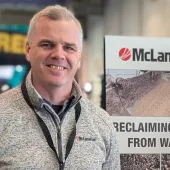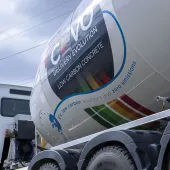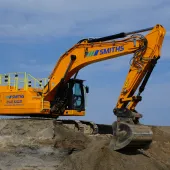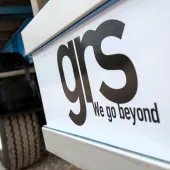Digital Waste Tracking
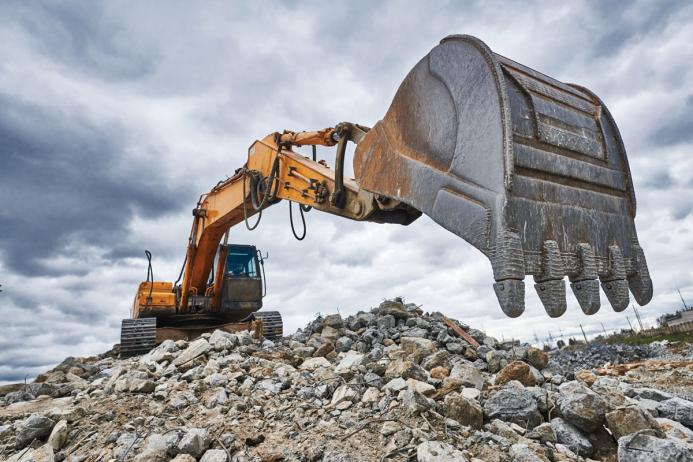
First published in the February 2024 issue of Quarry Management
A new era for land and waste recoveryThe issue of waste management has always been viewed as a linear one, with the ‘make, take, dispose’ paradigm providing the standard approach in recent decades. How can the construction sector move beyond this mindset to fully embrace a circular economy? Here, drawing on Tarmac’s recent specialist report, Hannah Haeffner, national recovery and recycling manager at Tarmac, explores how recent changes in legislation will soon mark a new era for land and waste recovery in the construction, demolition, and excavation sector and why it is time to start viewing waste as a valuable resource
The introduction of a mandatory digital waste tracking system in the UK is imminent. Formally introduced by The Department for the Environment, Food and Rural Affairs (DEFRA) in the Environment Act 2021, the introduction will, according to DEFRA, ‘…help businesses and government move towards a circular economy by joining up and digitizing currently fragmented systems to provide a single comprehensive way of tracking the amount and type of waste being produced and where it ends up.’ DEFRA also hopes that a new system would help ‘…(transform) the way environmental regulators monitor compliance, prioritize regulatory activities and help prevent waste crime, including fly-tipping, deliberate misclassification of waste, illegal waste exports and the operation of illegal waste sites. It will also facilitate a more level playing field for legitimate waste operators.’
The rollout will replace the existing paper-based system and is intended to both transform compliance and prevent waste crime. Every part of the waste chain will be digitally tracked, from waste producer to recycling or disposal, as well as the original waste and subparts of the waste system, without the need for enforcement officers having to check the current ‘fragmented’ paper-based system. Anyone who produces, handles, disposes of or makes products from waste must enter information on to the new system. The system will be available on a voluntary basis from 2024, with April 2025 having recently been confirmed as the mandatory deadline for implementation.
Changing mindsets
With the construction, demolition and excavation (CD&E) sector responsible for 62% of all waste in the UK and more than a third of waste in the EU, the move should be viewed as a positive one if we are to meet our climate obligations and move towards a circular economy. While there is no doubt that the transition itself will undoubtedly be felt across the sector, it will almost certainly lead to operational efficiencies; once we can see what wastes are produced, we can look to maximize the values of those wastes as resources. In addition, with waste crime costing the economy £1 billion a year and 18% of all waste estimated to be illegally managed, the new system provides an opportunity to reduce the ability for waste criminals to operate and undercut legitimate business. This will help level the playing field for those companies doing the right thing.
The current difficulty in collating up-to-date information is a very real challenge, with the Mineral Products Association (MPA) pointing out in a recent report: ‘The absence of regular data monitoring about material arisings and their use make it challenging to track the industry’s continuing progress.’
Quite simply, we cannot manage what we cannot measure: without the accurate tools to measure waste we have no way of having any real clear transparency to drive effective change.
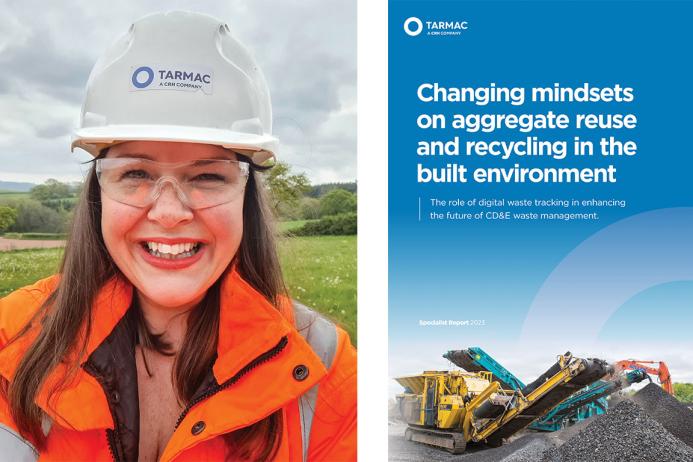
Fulfilling your duty
The Environment Act 2021 provides the new framework for environmental governance. Described by ministers at the time as ‘the most ambitious environmental programme of any country on Earth’, the legislation offers new powers to set UK-specific binding targets for aspects such as air quality, water, biodiversity, and waste reduction. Section 57 of the Act includes some changes to previous legislation to further support reuse, recycling, and recovery of waste materials, including the separation of recyclable waste from other waste.
When we look to where responsibility for waste lies, the simple answer is – everybody. The responsibility for what happens to waste or where it goes is on every organization in the value chain, regardless of whether services are contracted out. On a development site, for example, with a mixture of inert, hazardous, and non-hazardous soils, ultimate responsibility lies with the waste producers to ensure their waste is handled, transported, and received by correctly licensed facilities. However, everyone in the chain is liable if there is a prosecution for non-compliance, including the developer, contractor, or any sub-contractors. Crucially, the responsibility does not end when an individual organization transfers the waste.
Building on success
The foundations for success are there. The UK is among the leading recyclers of construction materials in Europe according to the MPA, which described how ‘…our industry is delivering sustainable environmental results while others just talk a good game.’ We must now plug the gap by building on this success.
The introduction of a mandatory digital system in 2025 will mean more transparency across the waste chain and will make it more important than ever for organizations to ensure that waste is managed responsibly once transferred to a licensed waste carrier. Better recovery and reuse of CD&E waste will cut waste crime, support environmental targets, and improve efficiency.
Yet, no single organization can drive the change needed. Everyone across the construction value chain must raise their own standards to close the loop on aggregate recovery and reuse. The tools to do so are already in place.
It is time to prepare for the introduction of the new system – get your systems in place and start driving efficiencies now.
To read Tarmac’s report, visit: www.tarmac.com/recycling-recovery-and-soil-management
Subscribe to Quarry Management, the monthly journal for the mineral products industry, to read articles before they appear on Agg-Net.com


